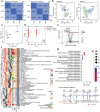Inhibition of inosine metabolism of the gut microbiota decreases testosterone secretion in the testis
- PMID: 38470251
- PMCID: PMC11019917
- DOI: 10.1128/msystems.00138-24
Inhibition of inosine metabolism of the gut microbiota decreases testosterone secretion in the testis
Abstract
Growing evidence indicates that gut microbiota is involved in the regulation of the host's sex hormone levels, such as through interfering with the sex hormone metabolism in the intestine. However, if gut microbiota or its metabolites directly influence the sex hormone biosynthesis in the gonad remains largely unknown. Our previous study showed that colistin, as a narrow-spectrum antibiotic, can significantly downregulate the serum testosterone levels and thus enhance the antitumor efficiency of anti-PD-L1 in male mice; however, the underlying mechanism for the regulation of the host's testosterone levels remains uninvestigated. In the present study, we analyzed the impact of colistin on the immune microenvironment of the testis as well as the composition and metabolism of gut microbiota in male mice. Our results showed that colistin has an impact on the immune microenvironment of the testis and can downregulate serum testosterone levels in male mice through inhibition of Akkermansia, leading to destroyed inosine metabolism. Supplement with inosine can restore testosterone secretion probably by prompting the recovery of the intestinal mucus barrier and the serum lipopolysaccharides levels. All these findings reveal a new pathway for the regulation of the host's sex hormone levels by gut microbiota.IMPORTANCEThis study demonstrates that exposure to even narrow-spectrum antibiotics may affect the host's testosterone levels by altering the gut microbiota and its metabolites. Our findings provide evidence that some specific gut bacteria have an impact on the sex hormone biosynthesis in the testis.
Keywords: Akkermansia; antibiotic; colistin; gut microbiota; inosine; testis; testosterone.
Conflict of interest statement
The authors declare no conflict of interest.
Figures






Similar articles
-
Gut microbiome-driven regulation of sex hormone homeostasis: a potential neuroendocrine connection.Gut Microbes. 2025 Dec;17(1):2476562. doi: 10.1080/19490976.2025.2476562. Epub 2025 Mar 12. Gut Microbes. 2025. PMID: 40071861 Free PMC article.
-
Gut microbiota steroid sexual dimorphism and its impact on gonadal steroids: influences of obesity and menopausal status.Microbiome. 2020 Sep 20;8(1):136. doi: 10.1186/s40168-020-00913-x. Microbiome. 2020. PMID: 32951609 Free PMC article.
-
How biological sex of the host shapes its gut microbiota.Front Neuroendocrinol. 2021 Apr;61:100912. doi: 10.1016/j.yfrne.2021.100912. Epub 2021 Mar 10. Front Neuroendocrinol. 2021. PMID: 33713673 Review.
-
Association Between Sex Hormone Levels and Gut Microbiota Composition and Diversity-A Systematic Review.J Clin Gastroenterol. 2022 May-Jun 01;56(5):384-392. doi: 10.1097/MCG.0000000000001676. J Clin Gastroenterol. 2022. PMID: 35283442 Free PMC article.
-
The effect of testosterone on the gut microbiome in mice.Commun Biol. 2024 Jul 19;7(1):880. doi: 10.1038/s42003-024-06470-5. Commun Biol. 2024. PMID: 39030253 Free PMC article.
Cited by
-
The potential influence and intervention measures of gut microbiota on sperm: it is time to focus on testis-gut microbiota axis.Front Microbiol. 2024 Oct 8;15:1478082. doi: 10.3389/fmicb.2024.1478082. eCollection 2024. Front Microbiol. 2024. PMID: 39439945 Free PMC article. Review.
-
Potential relationship of the gut microbiome with testosterone level in men: a systematic review.PeerJ. 2025 Apr 15;13:e19289. doi: 10.7717/peerj.19289. eCollection 2025. PeerJ. 2025. PMID: 40256744 Free PMC article.
-
The Androbactome and the Gut Microbiota-Testis Axis: A Narrative Review of Emerging Insights into Male Fertility.Int J Mol Sci. 2025 Jun 27;26(13):6211. doi: 10.3390/ijms26136211. Int J Mol Sci. 2025. PMID: 40649988 Free PMC article. Review.
-
Akkermansia muciniphila Metabolite Inosine Inhibits Castration Resistance in Prostate Cancer.Microorganisms. 2024 Aug 12;12(8):1653. doi: 10.3390/microorganisms12081653. Microorganisms. 2024. PMID: 39203495 Free PMC article.
References
-
- Malmberg R, Zietse M, Dumoulin DW, Hendrikx J, Aerts J, van der Veldt AAM, Koch BCP, Sleijfer S, van Leeuwen RWF. 2022. Alternative dosing strategies for immune checkpoint inhibitors to improve cost-effectiveness: a special focus on nivolumab and pembrolizumab. Lancet Oncol 23:e552–e561. doi:10.1016/S1470-2045(22)00554-X - DOI - PubMed
-
- Lindner AK, Lackner F, Tymoszuk P, Barth DA, Seeber A, Kocher F, Toth B, Hochleitner M, Pichler M, Pichler R. 2023. Sex hormones influence survival of patients with metastatic urothelial carcinoma undergoing immune checkpoint therapy. Biol Sex Differ 14:38. doi:10.1186/s13293-023-00522-x - DOI - PMC - PubMed
MeSH terms
Substances
Grants and funding
LinkOut - more resources
Full Text Sources
Research Materials

